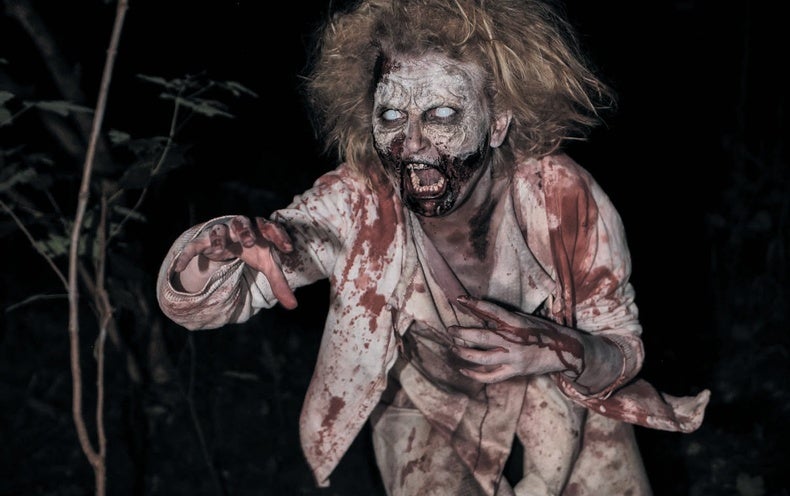- Messages
- 29,800
- Reaction score
- 5,196
- Points
- 288
“Grandmother, what big eyes you have!”
“All the better to see with, my child.”
“Grandmother, what big teeth you have got!”
“All the better to eat you up with.”
Chain saws roar, and spine-chilling screams echo from behind a dense wall of trees. You know you're at a scary attraction in the woods of Denmark called Dystopia Haunted House, yet everything sounds so real. As you walk into the house, you become disoriented in a dark maze filled with strange objects and broken furniture; when you turn a corner, you're confronted by bizarre scenes with evil clowns and terrifying monsters reaching out for you. Then you hear the chain saw revving up, and a masked man bursts through the wall. You scream and start running.
This might sound like the kind of place nobody would ever want to be in, but every year millions of people pay to visit haunts just like Dystopia. They crowd in during Halloween, to be sure, but show up in every other season, too. This paradox of horror's appeal—that people want to have disturbing and upsetting experiences—has long perplexed scholars. We devour tales of psychopathic killers on true crime podcasts, watch movies about horrible monsters, play games filled with ghosts and zombies, and read books that describe apocalyptic worlds packed with our worst fears.
More:

 www.scientificamerican.com
www.scientificamerican.com
“All the better to see with, my child.”
“Grandmother, what big teeth you have got!”
“All the better to eat you up with.”
The Evolutionary Reasons We Are Drawn to Horror Movies and Haunted Houses
Chain saws roar, and spine-chilling screams echo from behind a dense wall of trees. You know you're at a scary attraction in the woods of Denmark called Dystopia Haunted House, yet everything sounds so real. As you walk into the house, you become disoriented in a dark maze filled with strange objects and broken furniture; when you turn a corner, you're confronted by bizarre scenes with evil clowns and terrifying monsters reaching out for you. Then you hear the chain saw revving up, and a masked man bursts through the wall. You scream and start running.
This might sound like the kind of place nobody would ever want to be in, but every year millions of people pay to visit haunts just like Dystopia. They crowd in during Halloween, to be sure, but show up in every other season, too. This paradox of horror's appeal—that people want to have disturbing and upsetting experiences—has long perplexed scholars. We devour tales of psychopathic killers on true crime podcasts, watch movies about horrible monsters, play games filled with ghosts and zombies, and read books that describe apocalyptic worlds packed with our worst fears.
More:

The Evolutionary Reasons We Are Drawn to Horror Movies and Haunted Houses
Scary play lets people—and other animals—rehearse coping skills for disturbing challenges in the real world
